3 Affordable Alternatives to Life Alert (2025), Tested by Caregivers
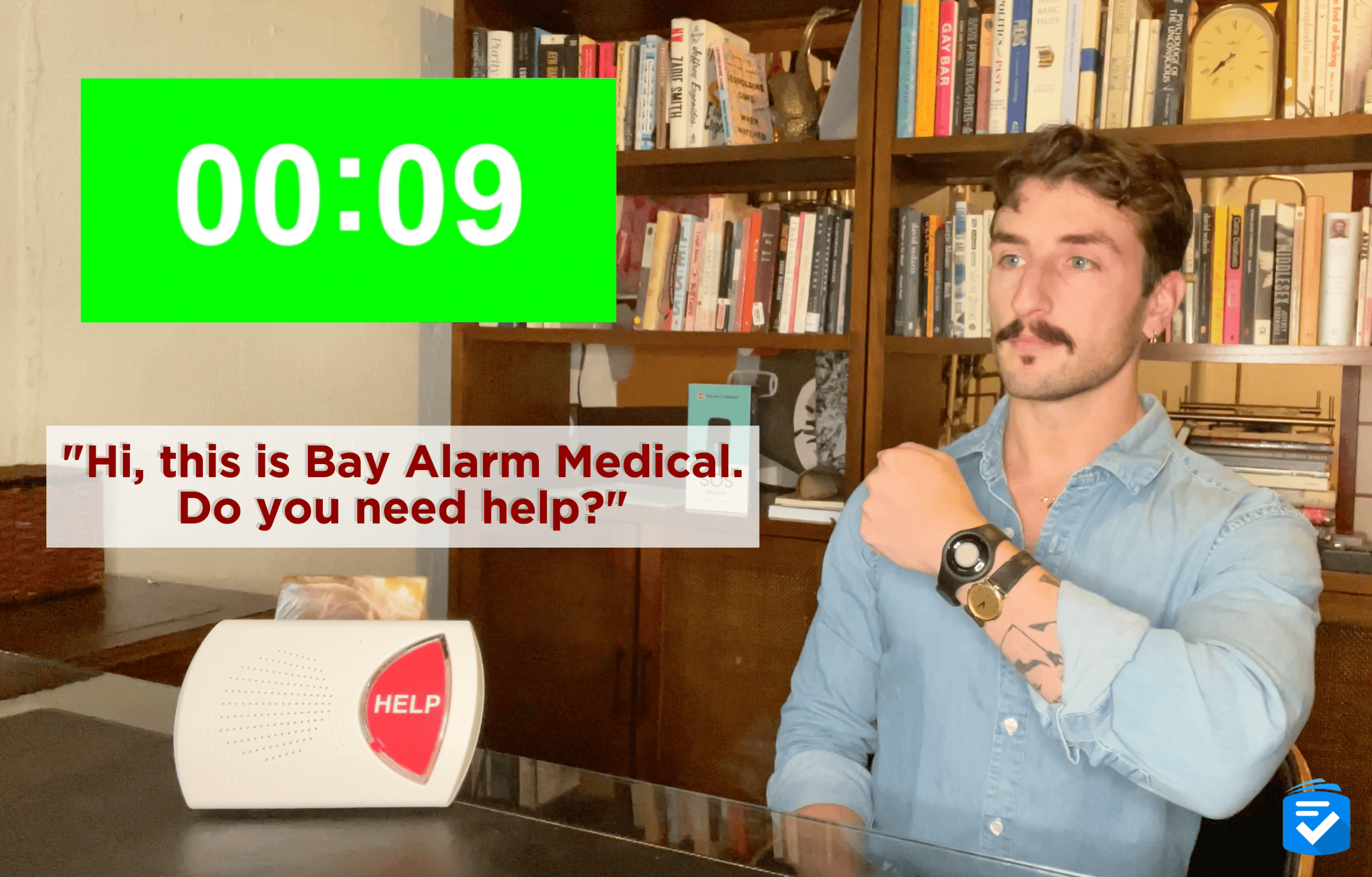
When it comes to protecting your loved ones, medical alert systems provide essential peace of mind — but they shouldn’t feel far out of your budget. Life Alert’s exorbitant pricing, restrictive three-year contracts, and surprisingly slow response times make it one of the least favorable options on the market today. Fortunately, several reliable alternatives deliver better performance at half the cost.
Based on over 5,000 hours of research and testing 50 different devices, our team of healthcare professionals has identified three standout alternatives that offer superior features. Some of the features include automatic fall detection, faster response times, and flexible month-to-month service. Those features come without the financial commitment that makes Life Alert such a poor value for seniors seeking independence and safety.
Why You Should Avoid Life Alert
Why You Should Avoid Life Alert
- High costs: Most medical alert systems cost about $30 to $40 per month, with affordable medical alert systems available for as low as $20 per month. Life Alert costs a minimum of $49.95 per month in addition to a $96 activation fee.
- Lengthy contracts: While most medical alert systems allow you to cancel your service at any time, Life Alert locks you into a three-year contract, which is practically unheard of in this industry. The only ways to get out of your contract are through death or transition to a 24/7 care facility.
- Long response times: As if the obscene pricing weren’t enough, Life Alert systems also made us wait upward of two minutes before our emergency calls were answered. Read our full Life Alert review to watch our test calls.
- No automatic fall detection: When it comes to Life Alert, most of my gripes are with the price; however, they are also one of few companies not to offer a medical alert with fall detection. If your loved one should fall and be unable to push their help button, they’ll have no way of contacting help.

Video Explanation
In this one-minute short, our Managing Editor, Ryan Molloy, explains why Life Alert is not worth the money.
FYI: Some medical alert systems come with no monthly fee. To learn more, read our rundown of the best unmonitored medical alert systems.
Why Trust TheSeniorList?
At TheSeniorList, our team of caregivers, experts, and healthcare professionals conducted over 5,000 hours of in-depth research and testing to recommend the most reliable brands and devices. In this process, our team:
- Tested 50 medical alert devices from 15 different brands.
- Surveyed 1,250 seniors and caregivers on medical alert system usage.
- Consulted with nurses, EMTs, and caregivers who are experts at caring for older adults.
- Published dozens of videos that demonstrate our medical alert system testing.
- Evaluated verified customer reviews of medical alert companies from the Better Business Bureau.
How We Test Medical Alert Systems
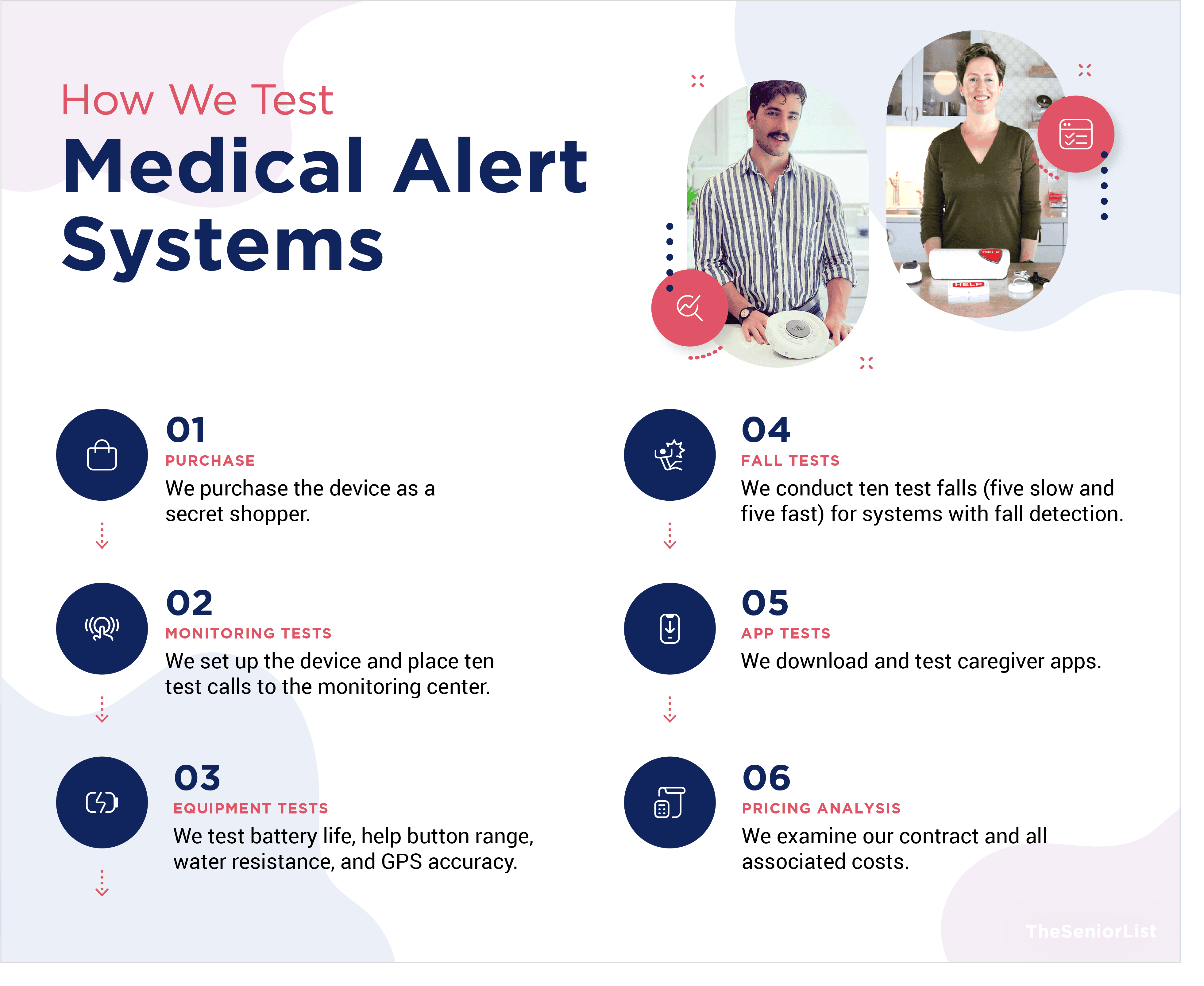
When choosing the best alternatives to Life Alert, we evaluated every medical alert system on the following criteria:
- Costs: Since Life Alert costs at least $50 per month, we looked for systems that cost far less.
- Contracts: Life Alert locks users into three-year service agreements, so we only included companies that allow monthly subscriptions.
- Response times: In our test calls, Life Alert agents took an average of 120 seconds to answer, so we looked for systems with response times of 20 seconds or less.
- Extra features: Life Alert lacks features like fall detection and caregiver apps, so we included systems that offered these options.

Our 3 Favorite Alternatives to Life Alert
- Bay Alarm Medical : Best Systems Overall
- Medical Guardian : Fastest Response Times
- ADT : Durable Equipment
Alternatives to Life Alert Compared
| Life Alert | Bay Alarm Medical | Medical Guardian | ADT | |
|---|---|---|---|---|
| In-home system | $49.95 per month | $24.95 per month | $29.95 per month | $31.99 per month |
| Mobile system | $89.95 per month* | $29.95 per month | $39.95 per month | $41.99 per month |
| Activation | $96-$198 | None on home systems; $99+ on mobile systems | None on home systems; $99+ on mobile systems | $99 |
| Contract | 3-year contract required | Not required; discounts offered for annual contracts | Not required; discounts offered for annual contracts | Not required |
| Fall detection | N/A | $10 per month | $10 per month | $11 per month |
* Life Alert does not currently offer its mobile system as a standalone purchase, so this price reflects the cost of the combined in-home and mobile system.
3 Affordable Alternatives to Life Alert
1. Bay Alarm Medical - Best Systems Overall
What We Like Most:
- 30-day risk-free trial
- Optional fall detection
- Location tracking on mobile units
- Systems starting at $19.95 per month
Overview

Bay Alarm Medical is one of the more affordable medical alert providers on the market. With their in-home systems starting as low as $24.95 per month, you could add on fall detection and still save significantly when compared to a Life Alert system.
Bay Alarm Medical alert systems include a traditional in-home system, a medical alert with GPS, an in-car system, and a medical alert smartwatch. You may also add on extra help buttons for $5 per month, making Bay Alarm Medical a great option for those who live with spouses or roommates.
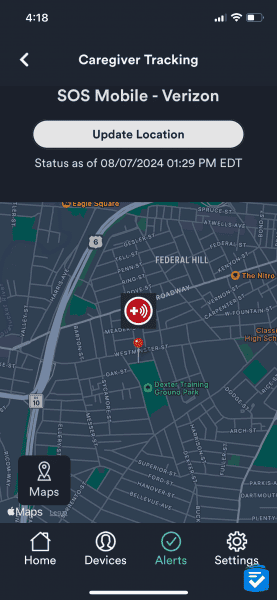
Compared to Life Alert, Bay Alarm Medical does not require any long-term contracts, and they offer a 30-day money-back guarantee. If you wish to cancel your service at any time, you may do so by returning your equipment, though you’ll have to pay the cost of shipping.
To learn more about this company, read my Bay Alarm Medical review.
>> Compare: Bay Alarm Medical vs. Life Alert
Pros
- Systems from $24.95 per month
- Accurate fall detection
- Free app for caregivers
- No activation fees on in-home systems
- 30-day trial periods
Cons
- Slower response times than Medical Guardian
- $99 equipment charges on mobile systems
2. Medical Guardian - Fastest Response Times
What We Like Most:
- No long-term contracts
- Quick response times
- Fall detection available
- 24/7 U.S. based monitoring
Overview
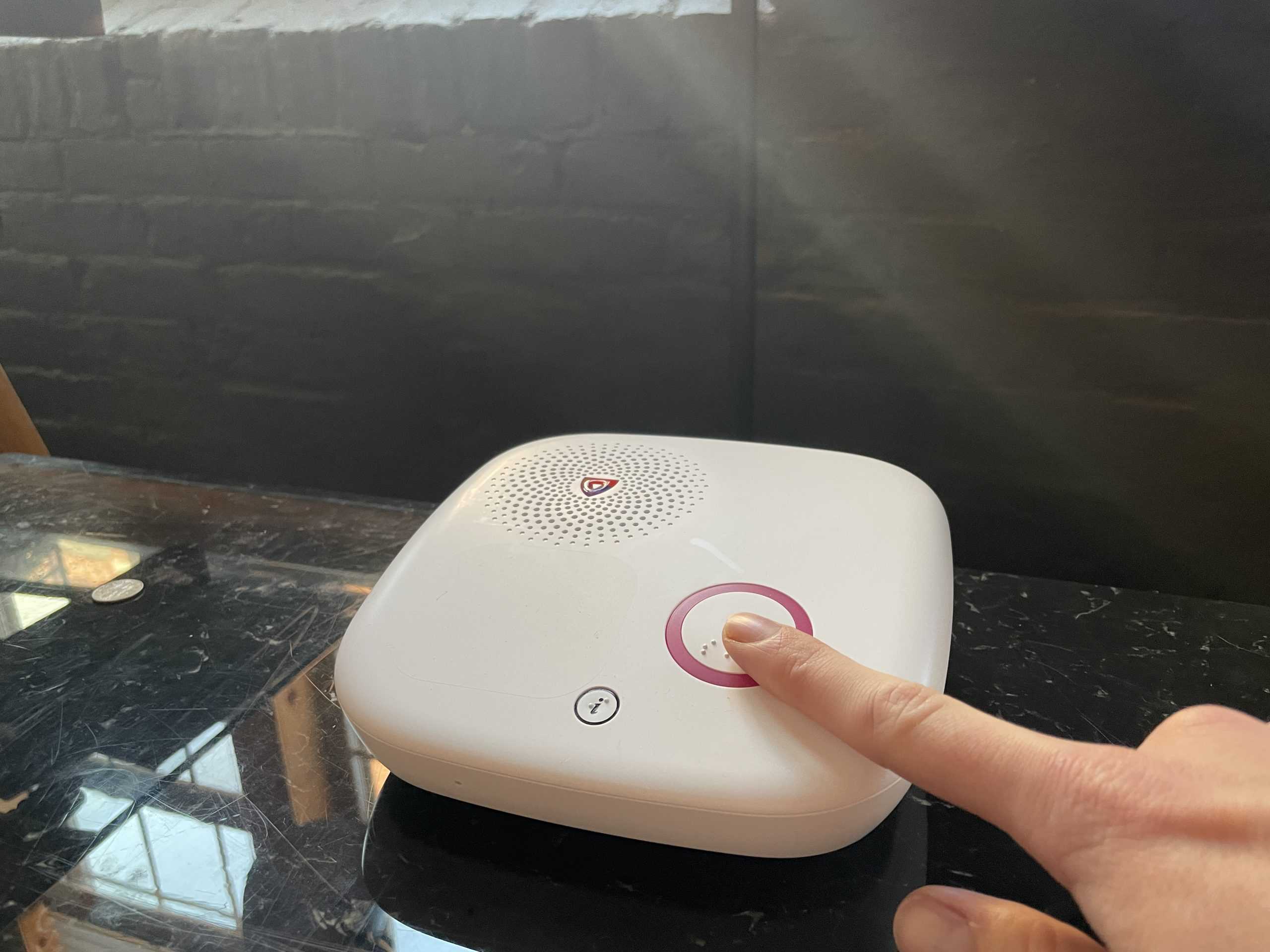
What makes Medical Guardian one of the best medical alert systems is the variety of its equipment. With two in-home systems and three mobile systems, they are an ideal option for anyone looking to stay safe in or outside their home. What’s more, their customer support and U.S.-based monitoring centers provide a stellar customer experience.
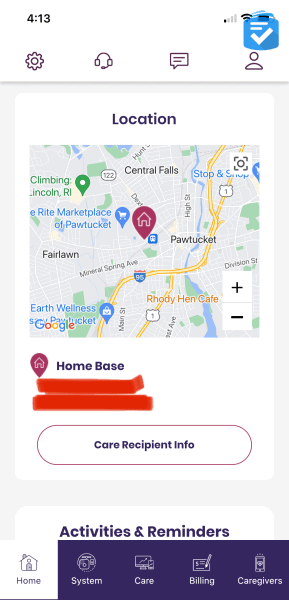
Medical Guardian costs as little as $29.95 per month, making them nearly half the cost of Life Alert’s most basic system. Additionally, Medical Guardian does not require long-term contracts, meaning that you may cancel your service and return your equipment with little hassle and no extra costs.
To learn more about Medical Guardian, read my full Medical Guardian review, including our hands-on MGMini review and MGMini Lite review, both of which are systems with GPS.
>> Compare: Medical Guardian vs. Life Alert
Pros
- All-in-one mobile system
- Landline and cellular options
- Smartwatch option
- Accurate location tracking
- Fall detection available on most systems
- No long-term contracts
- Free month of service on annual subscriptions
- Up to seven-day mobile battery life
Cons
- Occasional false alarms with fall detection
- Limited activity monitoring
3. ADT - Durable Equipment
What We Like Most:
- Waterproof help buttons
- Optional fall detection
- Quick response times
- Straightforward pricing
Overview
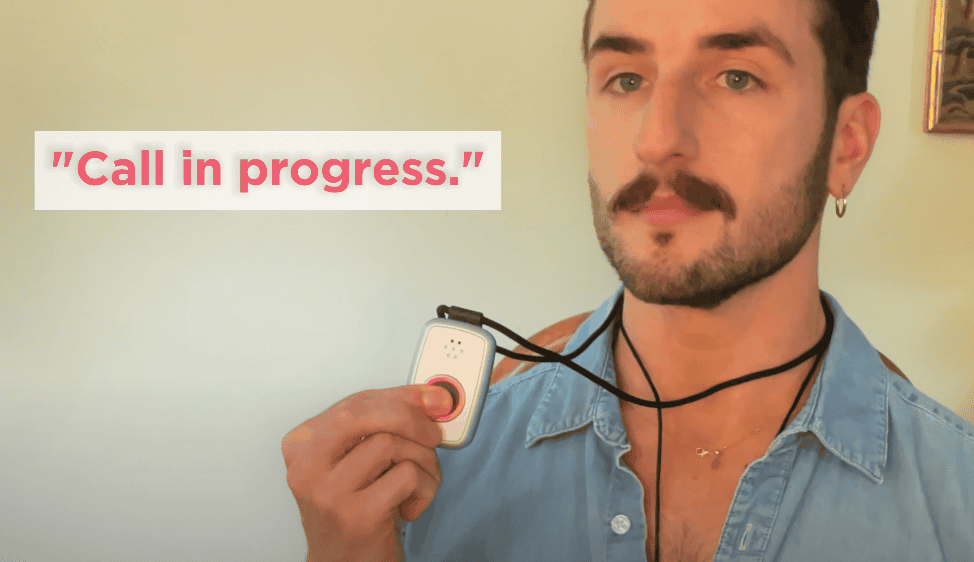
While ADT is widely known for its range of home security systems for seniors, ADT offers a trio of reliable and durable medical alert systems. ADT medical alert systems include three products: Medical Alert Basic System for in-home use, Medical Alert Plus System, and On-the-Go Medical Alert System — all of which can be paired with fall detection.
ADT’s medical alert systems also cost far less than those of Life Alert. Their in-home, landline-based system starts at $31.99 per month, and their mobile system costs $41.99 per month. None of these systems requires a long-term contract and includes free battery replacements.
To learn more about my experience with these systems, check out my ADT Health medical alert review.
Pros
- Waterproof help buttons
- No long-term contracts
- Automatic fall detection
- Personalized response plans
- Quick response times
- Landline options available
Cons
- Relatively small in-home range
- No smart features
- No caregiver tracking
Video Rundown
In this video, our Managing Editor, Ryan Molloy, walks through our favorite affordable alternatives to Life Alert.
Bottom Line
At TheSeniorList, our team has tested over fifty medical alert devices for fifteen companies. Through all of these tests, we have yet to find a company that either costs as much or takes as long to respond as Life Alert. Because of this, we think almost any brand is a better option, at least until Life Alert changes its approach to pricing.
>> Keep Comparing: Life Alert vs. Medical Alert
To find our latest research on medical alert systems, check out our guide to this year’s best medical alert systems.
Life Alert Alternatives Frequently Asked Questions
-
What are the alternatives to Life Alert?
Bay Alarm Medical, Medical Guardian, and ADT are some of the best alternatives to Life Alert, and none of them require long-term contracts.
-
Is any service better than Life Alert?
Bay Alarm Medical is a better medical alert provider than Life Alert, as they offer fall detection and don’t require a long-term contract.
-
Are medical alert systems covered by Medicare?
Medicare will not cover the cost of a medical alert system, as they are not considered durable medical equipment. Luckily, many medical alert systems cost less than $30 per month.
-
Can you get Life Alert for free?
While you likely can’t get Life Alert for free, local Area Agencies on Aging have been known to cover the cost of other medical alert systems. Reach out to your local branch to learn more.
-
What is the best personal alarm for the elderly?
While Bay Alarm Medical offers one of the best personal alarms for the elderly, Medical Guardian, ADT, Lively, and LifeFone are all solid choices. It all depends on the user’s preferences.
-
Does Life Alert require a contract?
Yes, Life Alert requires a three-year service agreement, one you can only exit through death or transition to long-term care.




